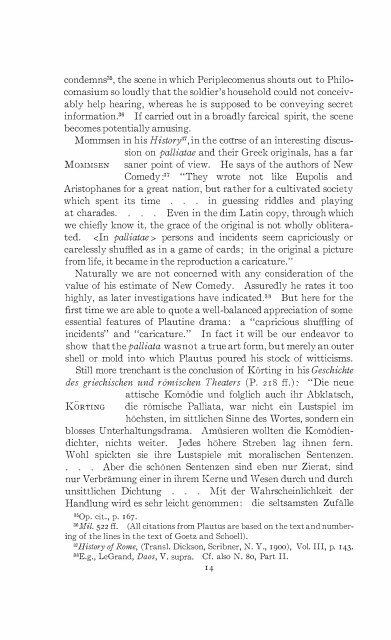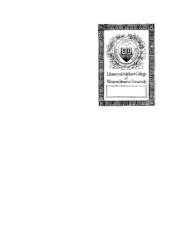Create successful ePaper yourself
Turn your PDF publications into a flip-book with our unique Google optimized e-Paper software.
condemns35, the scene in which Periplecomenus shouts out to Philocomasium<br />
so loudly that the soldier's household could not conceivably<br />
help hearing, whereas he is supposed to be conveying secret<br />
information.36 If carried out in a broadly farcical spirit, the scene<br />
becomes potentially amusing.<br />
Mommsen in his History37, in the coUrse of an interesting discussion<br />
on palliatae and their Greek originals, has a far<br />
MOMMsEN saner point of view. He says of the authors of New<br />
Comedy:37 "They wrote not like Eupolis and<br />
Aristophanes for a great nation, but rather for a cultivated society<br />
which spent its time in guessing riddles and playing<br />
at charades. Even in the dim Latin copy, through which<br />
we chiefly know it, the grace of the original is not wholly obliterated.<br />
persons and incidents seem capriciously or<br />
carelessly shuffled as in a game of cards; in the original a picture<br />
from life, it became in the reproduction a caricature."<br />
Naturally we are not concerned with any consideration of the<br />
value of his estimate of New Comedy. Assuredly he rates it too<br />
highly, as later investigations have indicatedB8 But here for the<br />
first time we arc able to quote a well-balanced appreciation of some<br />
essential features of Plautine drama : a "capricious shuffling of<br />
incidents" and "caricature." In fact it will be our endeavor to<br />
show that the palliata was not a true art form, but merely an outer<br />
shell or mold into which Plautus poured his stock of witticisms.<br />
Still more trenchant is the conclusion of Korting in his Geschichte<br />
des griechischen und romischen Theaters (P. 218 fl.):· "Die neue<br />
attische Komodie und folglich auch ihr Abklatsch,<br />
KORT<strong>IN</strong>G die romische Palliata, war nicht ein Lustspiel im<br />
hochsten, im sittlichen Sinne des vVortes, sand ern ein<br />
blosses Unterhaltungsdrama. Amusieren wollten die Komodiendichter,<br />
nichts weiter. J edes hohere Streben lag ihncn fern.<br />
W ohl spickten sie ihre Lustspiele mit moralischen Sentenzen.<br />
Abel' die sch6nen Sentenzen sind eben nur Zierat, sind<br />
nul' Verbramung einer in ihrem Kerne und <strong>IN</strong> esen durch und durch<br />
unsittlichen Dichtung Mit del' Wahrscheinlichkeit del'<br />
Handlung wird es sehr leicht genommen : die seltsamsten Zufiille<br />
"Op. cit., p. 167.<br />
36jlfil. 522 ff. (All citations from Plautus are based on the text and number<br />
ing of the lines in the text of Goetz and Schoell) .<br />
37IIistory of Rome, (Transl. Dickson, Scribner, N. Y., 1900), Vol. III, p. 143.<br />
3sE.g., LeGrand, Daos, V. supra. Cf . also N. 80, Part II.<br />
14
















